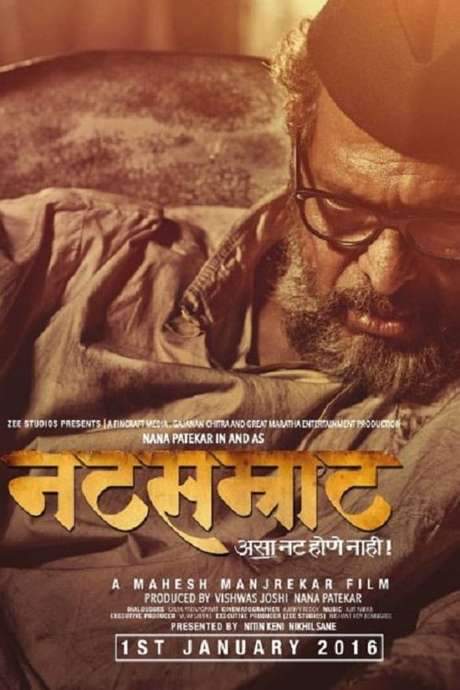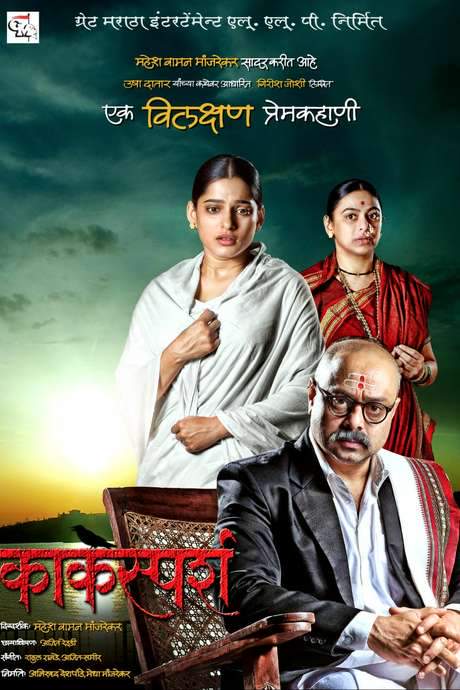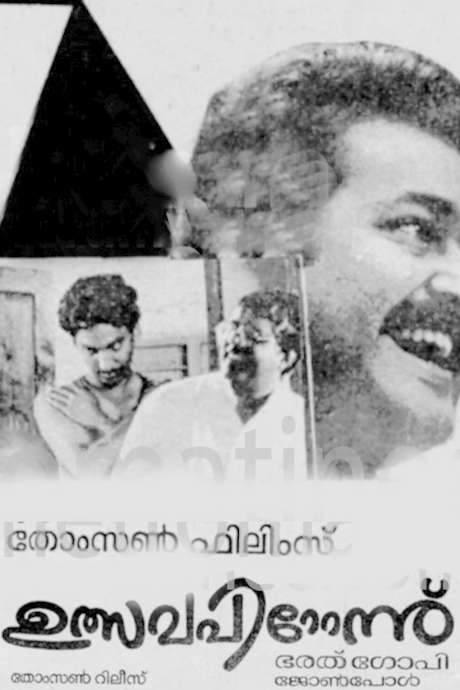
Natsamrat
Year: 2016
Runtime: 166 mins
Language: Marathi
Director: Mahesh Manjrekar
The King Of Theatre Appa, a veteran theatre actor who has primarily worked in adaptations of Shakespeare’s plays, falls upon hard times in his old age.
Warning: spoilers below!
Haven’t seen Natsamrat yet? This summary contains major spoilers. Bookmark the page, watch the movie, and come back for the full breakdown. If you're ready, scroll on and relive the story!
Natsamrat (2016) – Full Plot Summary & Ending Explained
Read the complete plot breakdown of Natsamrat (2016), including all key story events, major twists, and the ending explained in detail. Discover what really happened—and what it all means.
Ganpat Ramchandra Belwalkar Nana Patekar, known to friends and family as Appa, is a celebrated veteran theatre actor whose career flourishes on stage, with a special affinity for Shakespearean works. His talent earns him fame, fortune, and the coveted title of Natsamrat, a symbol of mastery in his craft. His artistry is not merely entertainer’s craft; it is a way of life, a lineage of performance that colors how he sees the world and his place within it.
Appa’s wealth and status are generous gifts he shares with his family, yet his blunt candor and fearless honesty set him apart. Only his wife Kaveri Medha Manjrekar and his close friend Rambhau Vikram Gokhale truly understand the man behind the limelight. His son Makrand and daughter-in-law Neha do not always appreciate his unvarnished nature, and their discomfort surfaces in socially awkward moments—whether guests are present or their granddaughter imitates his way of speaking and moving.
A turning point comes when their granddaughter performs a folk dance taught by Appa, a moment that triggers a clash with Neha’s sensibilities. An argument erupts at home, culminating in Neha slapping her daughter. The next day, Neha proposes to part ways and move out, hoping to give Appa and Makrand their space. Appa, who sees through the ploy, decides to leave as well, quietly resolute that the world is a stage and that his own role has become a sorrowful one. The sense of performance lingers in every choice he makes, even in heartbreak.
With Kaveri standing by him, Appa and his wife relocate to the home of his son-in-law Rahul and daughter Vidya. Rahul, a high-ranking engineer, is caring and steady, while Vidya faces embarrassments similar to Neha’s, yet Rahul’s support never wavers. On Vidya’s anniversary, an intoxicated Appa inadvertently embarrasses Rahul’s boss, an incident he apologizes for the next day, and Rahul treats it as an unfortunate but forgivable lapse. Throughout this stretch, Appa’s blunt sensibilities remain intact, and his poetry and recitations continue to enchant those around him.
Time passes, and Appa longs for Rambhau, visiting his old friend who is shattered by the death of his wife Kumud. Rambhau vents his pain and anger at being left alone in his final days, and a quiet, moving exchange unfolds between them. In the hospital, Rambhau performs a dialogue that blends Karna with Krishna, and Appa responds with a counter-performance that is both compassionate and haunting. Moved by Rambhau’s fragility, Appa fulfills his friend’s last wish in a deeply personal way.
The next chapter finds Appa returning to his son-in-law’s house, where a grim truth emerges: Rambhau has overdosed on sleeping pills. Kaveri reveals that Rambhau is gone, and Appa confesses that he had given him the pills, offering them as Rambhau’s final wish. The weight of this act haunts him, adding to the sense that the stage of life has become a treacherous, intimate space where responsibility and sorrow intertwine.
Another blow comes when Appa insults Rahul’s boss’s son during a clash over a botched adaptation of Othello, prompting Vidya to confront him once more. She fashions an outhouse for Appa and his wife so they can be independent, and Rahul remains supportive, even as he admits that this arrangement mirrors a family fracture that can’t easily be repaired. Vidya’s finances become a focal point as she misplaces cash given by her husband, triggering a rift that she eventually reconciles, but not before the emotional damage lingers.
The family’s next move takes them to their ancestral village and an old, dilapidated house. On the journey, Kaveri falls ill with fever and dies, leaving Appa bereft and more vulnerable than ever. A boot polishwala named Raja becomes a quiet pillar of support for him, as Appa drifts between memories and a painful present. He recites poetry and scenes from his plays at a street tea stall, captivating customers, while a young admirer named Siddharth—who holds acting in high esteem—follows him, convinced that Appa is the true Natsamrat Ganpatrao, even as Appa tries to hide his past from the devoted follower.
A startling news item confirms that Appa’s beloved theatre has burned down, reducing the stage he cherished to ashes. He hurries to the ruin, and Siddharth arrives beside him, having followed him there. Among the ashes, Appa relives the grandeur of his former life, and his family, along with Raja, joins him, pleading for him to return home. He resists, caught between the pull of memory and the demands of a fragile present. On that desolate stage, Appa delivers one final performance for Siddharth, arguing that theatre is truly about fulfilling one’s longing. Then, in a moment of raw vulnerability, he clutches his throat and collapses. The crowd rushes to help, but the life he lived on stage has ended, and Appa passes away, leaving a resonant legacy of art, longing, and humanity.
Last Updated: October 27, 2025 at 16:47
Explore Movie Threads
Discover curated groups of movies connected by mood, themes, and story style. Browse collections built around emotion, atmosphere, and narrative focus to easily find films that match what you feel like watching right now.
Movies about an artist's tragic decline like Natsamrat
Stories where celebrated artists confront the painful decline of their talent and relevance.If you were moved by the heartbreaking story of the aging actor in Natsamrat, you'll find similar powerful dramas here. These films feature celebrated artists, musicians, or performers confronting the painful decline of their talent, fame, and sense of self, leading to emotionally heavy and melancholic journeys.
Narrative Summary
Films in this thread typically follow a linear or slightly reflective descent, charting the downfall of a once-great artistic figure. The conflict is often internal, a battle with aging, changing times, or personal loss, rather than an external villain. The narrative structure is often a straightforward progression from grandeur to fragility, emphasizing the emotional weight of each step down.
Why These Movies?
These movies are grouped by their shared focus on the artist's psyche in decline. They share a melancholic tone, a deliberate pacing that allows the tragedy to sink in, and a high emotional intensity stemming from the collapse of a creative identity. The experience is consistently one of profound sorrow and poignant reflection.
Slow-burn family estrangement dramas like Natsamrat
Powerful stories where family bonds slowly unravel under the weight of grief and time.If the painful family dynamics and emotional isolation in Natsamrat resonated with you, explore these similarly moving stories. This collection features heartbreaking family dramas where relationships slowly unravel, focusing on themes of neglect, misunderstanding, and the heavy emotional toll of estrangement in a slow-paced, melancholic style.
Narrative Summary
The narrative pattern involves a central character, often an elder, becoming increasingly isolated from their family due to a combination of personal tragedy, pride, and miscommunication. The plot unfolds slowly, emphasizing the emotional distance growing wider with each missed connection. The climax is typically not a resolution but a poignant acknowledgment of the irreparable loss.
Why These Movies?
These films are united by their melancholic exploration of family breakdown. They share a slow, deliberate pacing that makes the estrangement feel inevitable and deeply felt. The emotional weight is consistently heavy, driven by themes of grief, loneliness, and the search for dignity when familial support systems fail.
Unlock the Full Story of Natsamrat
Don't stop at just watching — explore Natsamrat in full detail. From the complete plot summary and scene-by-scene timeline to character breakdowns, thematic analysis, and a deep dive into the ending — every page helps you truly understand what Natsamrat is all about. Plus, discover what's next after the movie.
Natsamrat Timeline
Track the full timeline of Natsamrat with every major event arranged chronologically. Perfect for decoding non-linear storytelling, flashbacks, or parallel narratives with a clear scene-by-scene breakdown.

Characters, Settings & Themes in Natsamrat
Discover the characters, locations, and core themes that shape Natsamrat. Get insights into symbolic elements, setting significance, and deeper narrative meaning — ideal for thematic analysis and movie breakdowns.

Natsamrat Spoiler-Free Summary
Get a quick, spoiler-free overview of Natsamrat that covers the main plot points and key details without revealing any major twists or spoilers. Perfect for those who want to know what to expect before diving in.

More About Natsamrat
Visit What's After the Movie to explore more about Natsamrat: box office results, cast and crew info, production details, post-credit scenes, and external links — all in one place for movie fans and researchers.




























